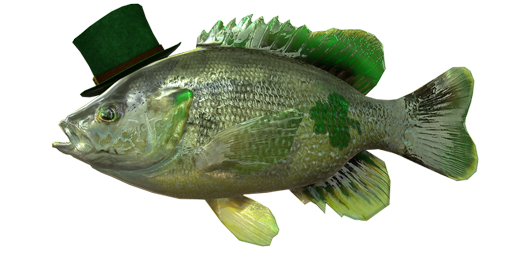Ah, St. Patrick’s Day – that fun time of the year to wear green, look for four-leaf clovers, maybe drink a couple of emerald-colored beers, and eat farmed fish tainted with malachite green. Wait…what was that last one?
Offshore finfish farming (OFF) is the mass cultivation of finfish in marine waters, in underwater or floating net pens, pods and cages. One of the many perils of eating industrially produced farmed finfish is that we never know the full suite of drugs and chemicals applied in the growing process. Malachite green is an antimicrobial compound used in aquaculture; it’s carcinogenic to humans and fish, and toxic for the environment. While banned in the US and EU, before we count ourselves lucky, keep in mind that we import a lot of farmed seafood from countries that use it.
Some OFF cheerleaders want to cordon off parts of the oceans for their own private profit. In a sleight of hand that would make a leprechaun blush, these proponents claim that the environmental impacts of growing thousands of pounds of fish crammed in giant cages is nothing to worry about and that our wild fisheries, fishing families, and marine ecosystems will be fine. They go so far as to say that our coastal communities will actually benefit, despite contaminated runoff from the farms and increased potential for harmful algal blooms due to concentrated fish waste.
The fairy tales we are told aim to confuse us. This is not positive, low-impact, and genuinely community-run aquaculture, but rather enormous factory-farms in our US federal waters run by large-scale corporations, and the only thing at the end of the rainbow is a big mess. Although, there might be a fat pot of gold for the chosen few, made easier when they’re subsidized by nearly $10 million in taxpayer dollars over the last 5 years alone.
While they may forgo malachite green in the US, domestic factory finfish farmers have a whole host of other toxic chemical cocktails to use. They might try organophosphates (OPs) to handle sea lice outbreaks; OPs can harm the nervous and reproductive systems, and are highly toxic to various aquatic species. Or perhaps, as the pests develop resistance to certain chemicals, the companies rely on more toxic solutions. A 2021 study found that as the sea lice became resistant to OPs used in fish farms, they spread into the ocean and flourished into stronger, OP-resistant populations far away from the fish farms. This OP-resistance has inspired industrial-scale finfish farmers to try their luck with something more toxic: Cypermethrin. This cancer-causing insecticide is 100 times more toxic than OPs to aquatic animals like lobsters, crabs, shrimp, and oysters.
Finally, even the fish feed itself can be contaminated, either via the terrestrial agriculture-based pesticides in the fish feed, which can transfer via uneaten food pellets to the farmed fish themselves as well as wild fish attracted to the excess fish feed. Any of these chemicals and many more are available for us to try our luck on.
We must stand up for our marine environment, coastal communities, and the many people historically linked to the oceans for their livelihoods. One way is to urge the Biden Administration to revoke Trump’s Executive Order 13921, so that the Federal government isn’t allowed to quietly fast-track permits for this large-scale nonsense. Sign our petition to tell the Biden Administration to revoke Trump’s Executive Order and urge them to support a healthy ocean and vibrant coastal communities.
By Akayla Bracey, Science and Regulatory Manager at Beyond Pesticides, and James Mitchell, Legislative Director at Don’t Cage Our Oceans

